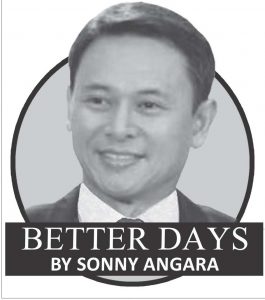The COVID-19 pandemic has caused much human suffering. But it has also catalyzed notable feats of human cooperation, ingenuity, and selflessness. Or as we put it succinctly—“bayanihan.” 
For instance, the Department of Trade and Industry (DTI) and select manufacturers worked hand-in-hand to transform the latter’s assembly lines to produce face masks and personal protective equipment (PPEs), instead of uniforms or children’s clothes for export. Distilleries for alcoholic products were similarly refashioned to produce ethyl- and isopropyl-based hand disinfectants.
The private sector mobilized its resources to feed up to 14.1 million Filipinos in the Greater Manila Area. This includes Project Ugnayan of the Philippine Disaster Resilience Foundation (PDRF), which tapped Caritas Manila’s vast network of clergy and parishioners to distribute grocery vouchers, worth P1,000 each, to nearly 10 million Filipinos in Metro Manila.
Late last year, the Department of Labor and Employment (DOLE) forged an agreement with IBPAP (Information-Technology Business Processing Association of the Philippines) to help match the thousands of returning OFWs with job vacancies in the BPO sector. Some 40,000 returnees have reportedly been connected to 36 BPO companies, as a result.
When our testing capabilities needed to be ramped up, multi0stakeholder initiatives were launched to set up laboratories and clinics across the country. There was the initial work of the Department of Health (DOH) towards crafting a strategy for enhancing the testing capacities of sub-national laboratories and licensing additional testing centers, and more. This effort eventually led to the formation of the public-private Taskforce T3 (Test, Trace, Treat), which is now preparing to help with the National COVID-19 Vaccine Roadmap.
In these instances and more, there was bayanihan in action. There were different organizations and groups working together, collaborating and cooperating. There here was no clear divide between the public and private sector. All there was—was a network of people moving in concerted action. All there was—was a nation seeking help from its partners to survive and weather a crisis, the biggest and most challenging it has faced in recent history.
I emphasized during my keynote at a recent webinar co-organized by the Ateneo School of Government and Ayala Corporation, that this heightened level of engagement between the public and private sector needs to continue even after the pandemic—especially because of the critical tasks-at-hand of immunizing our people, preventing even more COVID-19 cases as we reopen, and building back a more resilient and inclusive economy.
For instance, not only will we need to pool as much funds as we can to procure vaccines, we will also need to secure the necessary logistical requirements. Public and private partnerships will also be needed to ensure that we have enough vaccinators to immunize our people in the shortest amount of time possible. Most importantly, multi-stakeholder efforts will also be needed to convince a majority of our people about the necessity and safety of the vaccines that have already been approved for roll-out.
And then, as more of our people start venturing out of their homes, it is incumbent upon both the private and public sector to make sure that health and safety protocols are strictly followed. We need to make sure that we reopen our economy safely and reasonably. We may have already started on the path to herd immunity, but that doesn’t mean we’re already out of the pandemic.
If we can immunize our people expediently and prevent any more COVID-19 infections, then we will survive this pandemic. But for us to emerge stronger and more resilient, we need to think ahead and plant the seeds of our future growth and prosperity today. One of those seeds, I believe, should have economic self-reliance as its fruit.
If anything, the pandemic has shown us that our consumption-driven, import-heavy economy is not very resilient, especially when faced with a public emergency that restricts our people from roaming freely and spending their money across the country. Clearly, we need to build up our local capacities to produce more of the things we need and use—but also with an eye on exporting these once we are capable of doing so. Not one government agency or private sector initiative can address this issue by itself. We need a network of solutions to build back better our economy.
In short, closer public and private sector collaborations should be part of our next normal. And with the immense challenges we face as a society today, it should be the rule, rather than the exception.
***
Sen. Sonny Angara has been in public service for 16 years. He has authored and sponsored more than 200 laws. He is currently serving his second term in the Senate. E-mail: sensonnyangara@yahoo.com | Facebook, Twitter & Instagram: @sonnyangara/WDJ
